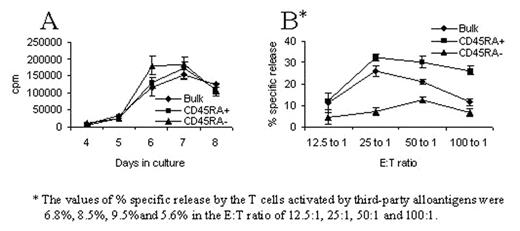Abstract
We and others have recently demonstrated that memory T cells do not induce graft-versus-host disease in several different animal models. To test whether the same concept applies to humans, we compared the ability of memory T cells to respond to alloantigens with that of naive as well as bulk T cells. Purified T cells were first obtained from peripheral blood from healthy donors and then separated into memory and naive T cell subsets based on the expression of CD45RA (memory: CD45RA−, naive: CD45RA+). Memory T cells were subsequently tested for their ability to respond to alloantigens using proliferation and cytotoxicity assays in comparison with naive and bulk T cells. Proliferation assay was performed using 1.25x105 responder cells and 5x105 irradiated stimulator cells per well in 96-well flat-bottom plate. Cytotoxicity was measured by the standard 4-hour Cr-51 release assay after 5-day mixed lymphocyte culture. In contrast to the mouse data, memory T cells proliferated equally well as naive and bulk T cells did in mixed lymphocyte culture (Figure A). However, these same memory T cells failed to kill the allogeneic targets despite the vigorous proliferative responses against the same alloantigens (Figure B). These data demonstrated that human memory T cells proliferate but do not elicit cytotoxicity in response to alloantigens, suggesting that human memory T cells may not contain true alloantigen-specific T cells if they have never exposed to those alloantigens before and may not cause graft-versus-host disease upon in vivo transfer. These observations warrant the further testing of human memory T cells in clinically more relevant models and in vivo for their ability to induce graft-versus-host disease.
Author notes
Corresponding author


This feature is available to Subscribers Only
Sign In or Create an Account Close Modal